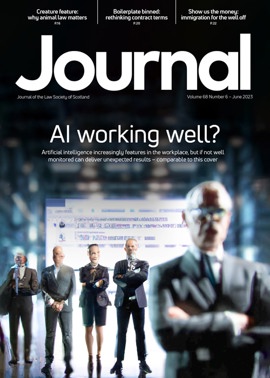Intellectual property: Who owns AI generated copyright?
For those advising on intellectual property law, there are several legal concerns arising out of AI generative models, such as copyright infringement and misuse of personal data. However, it is the opportunity for obtaining copyright out of AI generative models, and who that copyright belongs to under UK law, that is the focus of this article.
Current copyright law
Section 9(3) of the Copyright, Designs and Patents Act 1988 (“CDPA 1988”) creates a special category of “computer generated” works that is afforded copyright protection. This provides copyright protection to work defined as “generated by a computer in circumstances such that there is no human author of the work” (s 178), and in these special circumstances the author “shall be the person by whom the arrangements necessary for the creation of the work are undertaken”.
Who is that person?
The answer as to who makes the “necessary arrangements” and therefore obtains the copyright protection remains uncertain; however it is widely considered to be either the programmer or the user of the AI generative model, given their imperative involvement in the creation of such works.
Existing case law seems to favour the programmer, as Judge Wills in Kenrick & Co v Lawrence & Co (1890) 25 QBD 99 held that it was inconceivable that an individual who did all the work to create an artistic creation could be excluded from authorship. Additionally, in Nova Productions v Mazooma Games [2007] EWCA Civ 219 the input by the user was not considered artistic enough to qualify for its own copyright protection and accordingly it was the programmer that received authorship of the work.
The positions adopted by the courts in these cases show the extent to which the courts are willing to consider the level of contribution from each party to the creation of the work when determining authorship. When these principles are applied to AI generative models, it can be easy to see how the courts may determine that the programmer is the ultimate author of the work produced, given their level of investment and knowledge in the AI software in comparison to the user’s simple input of text.
Does the law need modernising?
An alternative answer in identifying the person who makes the “necessary arrangements” is that the law is outdated and that providing a conclusive answer may be unachievable without a modernisation of copyright laws relating to AI. When the CDPA passed into law in 1988, the landscape of what AI would look like and how it would operate was almost non-existent. Therefore, drafting statutory provisions to govern the complex copyright issues of work produced by AI without understanding how AI would work in practice was inevitably going to require modernisation at some stage.
It is potentially the horizon of AI generative models which highlights the shortfalls of the current provisions. An example of these inadequacies can be seen in s 9(3) of the CDPA, with its reference to “the person by whom the arrangements necessary for the creation of the work are undertaken”. Such wording anticipates there will be an obvious natural or legal person responsible for the creation of works. However, the rise of AI generative models in which input from both the programmer and user are “necessary arrangements” for the output to be generated, challenges the applicability of current UK copyright laws in relation to AI.
An additional tension exists between the current copyright provisions and the fundamental principle in copyright law of “originality”. Copyright subsists in “original artistic works”, with case law defining originality as the author’s “own intellectual creation” (Infopaq International A/S v Danske Dagblades Forening (C-5/08) EU:C:2009:465). Even where the programmer or the user of the AI generative model is identified as the author of the work, it is difficult to categorise the work as either party’s “own intellectual creation”, given that AI is ultimately responsible for analysing the datasets and producing the piece of work. Accordingly, even where the person who makes the “necessary arrangements” for the creation of the work is identified under the current provisions, such identification of an individual would create tensions with existing provisions under copyright law.
In summary, certainty as to the authorship of the output from AI generative models is far from clear, and even where existing case law may provide further clarity to this question of authorship, that may create conflicts with pre-existing legal principles in copyright law. Therefore, it does seem that a revision of copyright laws to address the current challenges that have arisen because of the surge of AI generative models may be required.
Perspectives
Features
Briefings
- Criminal court: Dangerous or careless?
- Corporate: Bill gives CMA consumer enforcement powers
- Agriculture: A question for the Land Court?
- Intellectual property: Who owns AI generated copyright?
- Succession: Variation by an attorney?
- Sport: Participation in LIV Golf ruled out of bounds
- Scottish Solicitors' Discipline Tribunal: June 2023
- Data protection: Meta's mega matter
- In-house: Scanning wider horizons






